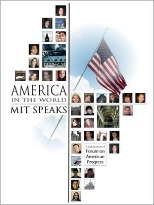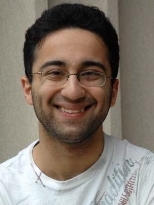Ali Wyne, a senior in management and political science, recalls how four years ago he couldn't get anyone to talk politics. Virtually none of his friends took an interest in the 2004 presidential election.
But this year, those same friends are attending rallies, working for campaigns, starting organizations, writing blogs and making their voices heard--a transformation catalyzed by Democratic Sen. Barack Obama's candidacy, Wyne says.
A prolific opinion writer for The Tech and vice president of MIT's Undergraduate Association, Wyne is showcasing his fellow students' new political energy in "America in the World: MIT Speaks," a booklet of 25 essays published by Forum on American Progress, which Wyne founded in his freshman year.
To produce the booklet, Wyne invited a diverse group of student leaders to describe what they thought the United States must do to make the world a better place in 2008.
The question that he posed, modeled closely on the one asked of global leaders at the 2008 World Economic Forum, elicited bold, lively proposals--no surprise, Wyne says.
"MIT students approach problems in an objective, analytical manner; they're also willing to take risks to advance bold ideas. Almost by definition, they're best suited to driving change," he says.
"America in the World" urges the United States to participate in addressing and solving global problems. Essay titles include "Consider the Nexus of Law and Food Security in Africa" by Raja H.R. Bobbili, a senior in electrical engineering and computer science; "Build Schools to Inhibit the Taliban's Recruitment Efforts" by Adnan Esmail, a sophomore in mechanical engineering and management, and "Acknowledge the Deficiencies of the Microcredit System" by Reshmaan Hussam, a junior in economics.
The "America" authors comprise 13 women and 12 men who represent 15 majors and all four undergraduate classes. Their parents are from Zambia, Lebanon, Pakistan and other countries. They are involved in student government, public service, research, athletics, business and arts.
"Selecting a diverse group of authors was critically important. A publication with the subtitle 'MIT Speaks' must make every effort to represent the tremendous diversity of MIT students," Wyne says.
Wyne, who hopes to enter politics himself one day, intends to submit the booklet to whichever candidate prevails this November, he says.
Next fall, as the presidential race concludes, Wyne will be a 2008-09 Junior Fellow at the Carnegie Endowment for International Peace (CEIP), working under the director of CEIP's China Program.
As for "America in the World," Wyne hopes the booklet will serve as a model for other schools and for future projects that demonstrate the ability of youth to effect change on a global scale.
"America in the World," the first publication of its kind at the Institute, received support from 12 different MIT departments and centers including the Office of the Dean for Undergraduate Education, Technology and Culture Forum, The Center for International Studies, the School of Humanities, Arts, and Social Sciences, and the Public Service Center.
A version of this article appeared in MIT Tech Talk on June 4, 2008 (download PDF).







